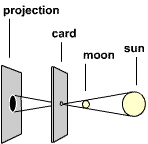How To View An Eclipse
Created | Updated Mar 18, 2002

Eclipses used to be considered portents for all kinds of catastrophes, such as earthquakes, pestilence and breakfast cereal name-changes. However, the tragedies they foretold most accurately were large numbers of people being partially blinded by staring at the eclipse for too long. Fortunately that happens less often now, as the huge amount of hype that leads up to eclipses these days usually contains plenty of safety warnings.
But what is it about eclipses that can damage the eye so badly? Well, it's plain old sunlight. Normally you hardly spend any time looking directly at the sun (usually not more than a second) but since an eclipse is a major spectacle, you'll want to stare at it for a couple of minutes. If you've ever looked at a strong light, looked away and seen the image of the light still glowing in your vision, you've experienced retina burn-in. The retina's at the back of your eye, and it's covered in millions of light-detecting sensors that translate the light that's hitting them into an image to send to your brain. When very strong light hits them they effectively get bruised, and they'll still be reporting the light even when you're not looking at it any more. Usually it only takes a few seconds for them to recover, but that's after looking at a strong light bulb for a minute, or the sun for a couple of seconds. Looking at the sun for a whole minute, however, can cause much worse damage those sensors, possibly even permanently. (If you've ever magnified the sun's light and used it to set fire to something, you've seen how powerful it can be.) And you can't rely on your pain sensors to tell you when you've had enough, either.
So looking at the eclipse directly without any form of protection is obviously a bad idea. The other options we're going to discuss are:
- Not looking at it at all.
- Looking at it through special dark glasses.
- Projecting the image of the eclipse onto something else and looking at that.
Forget option 1. Eclipses are just too interesting to ignore.
Option 2 can be a bit risky. Firstly, normal sunglasses won't cut it - you'll need lenses that are much darker than that. Around eclipse time there are usually special sunglasses on sale, specifically meant for totality viewing. These are probably okay to use, but you'd be forgiven for thinking that safety is rather lower on the manufacturers' priority lists than cashing in on a stellar event, and so you may want to move on to option 3.
Image projection is the method that all the smart astronomers bang on about, so it's the one we'll explain in most depth. The two main components of a projector are a hole to focus the light, and a screen to project the image on to. The focus hole should be in a thin but opaque surface - aluminium foil's good, especially if you make a cardboard frame for it. (It's easy: get a sheet of cardboard, cut a hole in it, cover the hole with foil, you're done.) The hole itself should be tiny; make it with a pin. (The smaller the hole, the more focused the image will be.) A piece of white cardboard will be fine for the projection screen.
To get a decent-size image, you'll need to hold the focus hole quite far from the screen. The image diameter will be approximately one-hundredth of the distance from the hole to the screen, so if you hold the hole 3 metres from the screen, the image will be about 3 centimetres across.
That's the basic principle, but there are many ways of making a projector. You can be fancy about it: take a very long cardboard box or tube, put the focus hole at one end and use the inside of the other end as the screen (you've have to cut a hole in the side so you can see it). Alternatively you can go in the opposite direction, forget about the foil and pin and just cross your fingers at right angles, using the gaps as focus holes.
There you go! All you need now is:
- Some card, foil and a pin
- Something fun to do while everyone else is blinded
- A primitive civilisation that you can trick into believing that you're some kind of sun god
- A clear sky
... and you're sorted!
